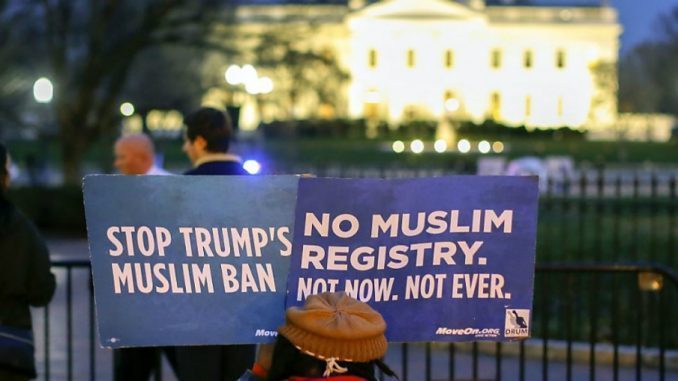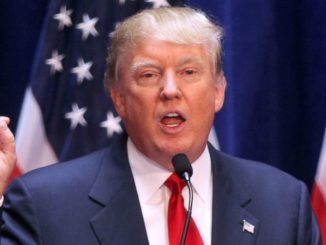
After the US president Donal Trump issued his new Travel ban order, Several US states have said they will move forward with legal challenges to it, as Trump’s initial ban was blocked by a similar lawsuit.
Donald Trump has signed in January an executive order that will limit immigration and refugees from some Muslim-majority countries, fulfilling a campaign-trail promise to introduce what he dubbed “extreme vetting.”
The order bans Syrian refugees, claiming they are “detrimental” to the interests of the United States, and suspends the refugee admissions program for all countries for 120 days. It will also suspend the issue of visas to nationals of countries where the US believes they do not provide enough information on an applicant to decide whether or not they are a security or public safety threat.
Those countries were Iran, Iraq, Libya, Somalia, Sudan, Syria, and Yemen.
This order created chaos in the US as many considered it unlawful and sought to stop its implementation, and was blocked later by several federal courts in the US.
However, Trump’s administration kept working on a new travel ban order and announced it on March 6.
The new order and the changes its brings
President Donald Trump has signed a revised executive order banning refugees and citizens from six Muslim-majority nations from entering the United States.
For 120 days, the US will not allow any new refugees into the country and for 90 days, visas will not be issued to people from Iran, Libya, Somalia, Sudan, Syria, and Yemen.
These are the major changes to Trump’s first immigration order, which was blocked in the courts.
Iraqis off the list – Iraqis are removed from the list of banned nationals. The White House said Iraq was removed because it has imposed new vetting procedures such as heightened visa screening and data sharing, and because of its work with the US in countering ISIS.
Only new visa applicants included – Travellers from the six banned countries who already have visas, and refugees who have already been given visas will not be barred from entering the US.
“Green card” holders and dual citizens exempt – Permanent residents of the US or dual-national citizens from listed countries will not be turned away and “green card” holders traveling abroad will no longer be at risk of being unable to return home.
Implemented from March 16 – The original ban took effect immediately, without warning, causing chaos at airports as travelers already midair when the order was signed were detained in airports and others were prevented from boarding planes.
Syrian refugees not singled out – The original order banned refugees from Syria from entering the US indefinitely. The new order removes that clause.
Loophole closed for religious minorities – While the original order made an exception for refugees who are members of “persecuted religious minorities”, saying they could enter the US despite the ban, the new order has no mention of religion.
strengthening US national security
The Iraqi government said the revised order sends a “positive message” about the future of bilateral relations as the two countries work to combat ISIS.
Saad al-Hadithi, the government spokesman, said the decision to revise the ban shows that there is a “real partnership” between Washington and Baghdad.
An analyst said: “[US officials] have tried to take what was the existing executive order, make it much tighter, and essentially make it bullet proof in the courts.”
Rex Tillerson, the US secretary of state, said that the renewed ban is “a vital measure for strengthening our national security”.
“With this order, president Trump is exercising his rightful authority to keep our people safe,” he said.
Attorney General Jeff Sessions said the order “responsibly provides a needed pause so we can carefully review how we scrutinize people coming here from these countries of concern”.
“Three of these nations are state sponsors of terrorism,” Sessions said, referring to Iran, Sudan, and Syria, adding that others had served as “safe havens” for fighters.
New order challenged by several states
Several US states have said they will move forward with legal challenges to President Donald Trump’s revised executive order.
Washington state, which was the first to sue over Trump’s initial travel ban, argued that the revised order violates the constitution “by disfavouring Islam”.
Attorney generals in the states of New York, Massachusetts and Oregon said they had taken steps to join the lawsuit that Washington had filed along with Minnesota.
The opposition comes on top of a separate legal challenge to the new ban brought by Hawaii.
Oregon Attorney General Ellen Rosenblum said the executive order has hurt Oregon, its residents, employers, agencies, educational institutions, healthcare system and economy.
New York Attorney General Eric Schneiderman called the executive order “a Muslim ban by another name”.
The attorney general in Hawaii argued that while the new order features changes to address complaints raised by courts that blocked the first travel ban, the new order is pretty much the same as the first one.
“Nothing of substance has changed: There is the same blanket ban on entry from Muslim-majority countries (minus one),” state attorney general Doug Chin said in a statement.
Hawaii’s lawsuit says the order will harm Hawaii’s Muslim population, tourism and foreign students.
Will this challenge and lawsuit work?
University of Richmond Law School professor Carl Tobias said Hawaii’s complaint seemed in many ways similar to Washington’s successful lawsuit, but whether it would prompt a similar result was tough to say.
Given that the new executive order spells out more of a national security rationale than the old one and allows for some travelers from the six nations to be admitted on a case-by-case basis, it will be harder to show that the new order is intended to discriminate against Muslims, Tobias said.
“The administration’s cleaned it up, but whether they have cleaned it up enough I don’t know,” he said. “It may be harder to convince a judge there’s a religious animus here.”
Tobias also said it is good that Hawaii’s lawsuit includes an individual plaintiff, considering that some legal scholars have questioned whether the states themselves have a standing to challenge the ban.
Imam Ismail Elshikh of the Muslim Association of Hawaii is a plaintiff in the state’s challenge. He says the ban will prevent his Syrian mother-in-law from visiting him.



